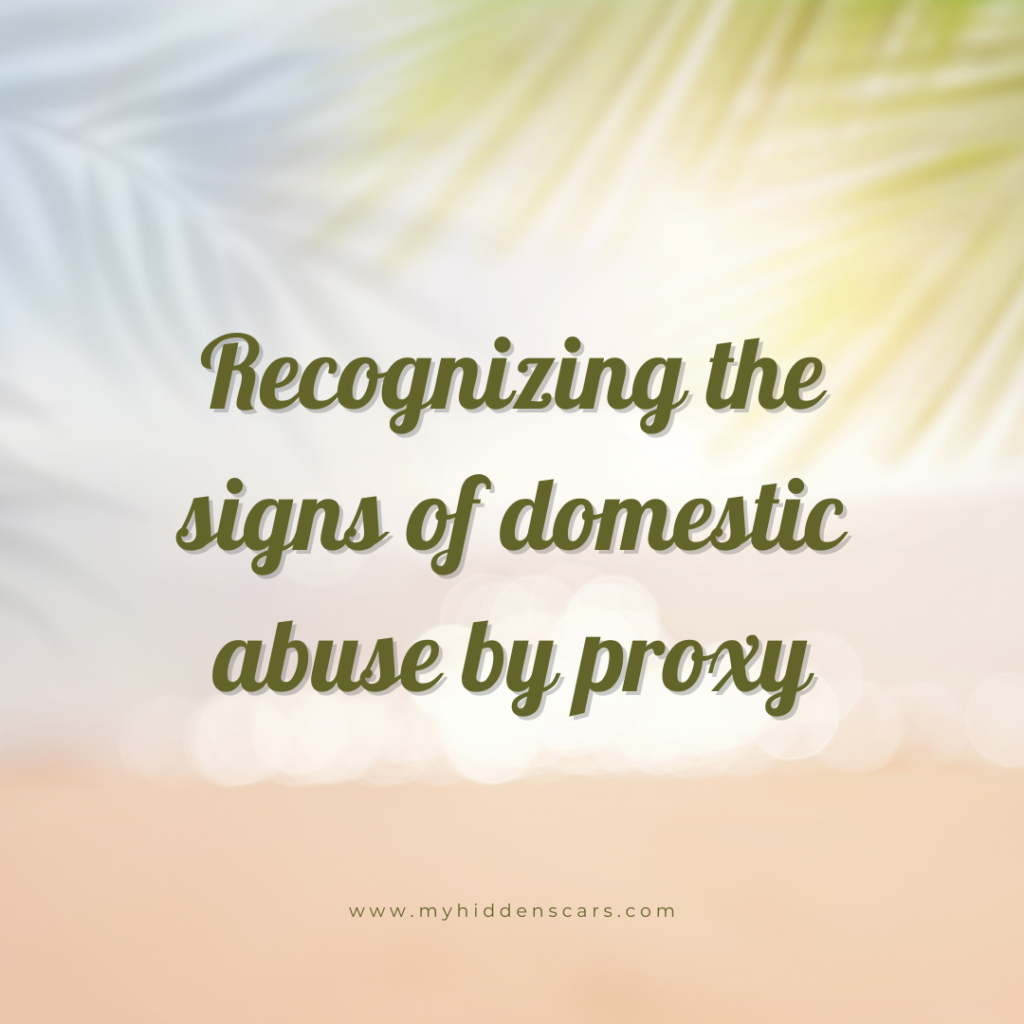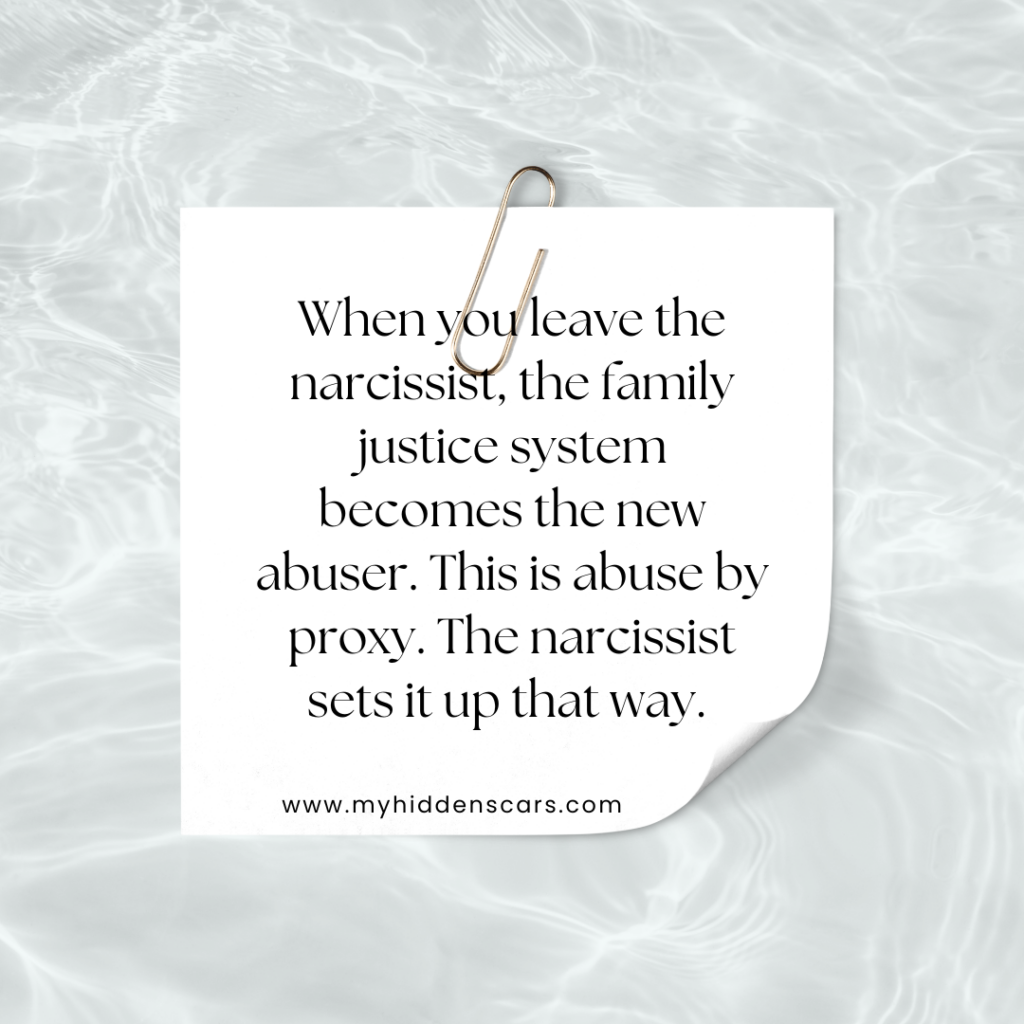Divorce is often an emotionally challenging and complex process, especially when it involves high-conflict situations and domestic abuse. The circumstances can take a painful turn, leading to another less-known form of abuse known as “domestic abuse by proxy.” As a divorce coach, I think it is important to explain and share what this is and help victims and their families navigate its treacherous waters. I want to help others understand domestic abuse by proxy, its impact, warning signs, and a plan to support those affected.

Understanding Domestic Abuse by Proxy
Domestic abuse by proxy, also known as “coercive control by proxy” or “third-party abuse,” refers to a manipulative tactic used by an abuser to maintain control over their victim after separation or divorce. This abuse involves using children, family members, or friends as middlemen to continue using power and control over the targeted individual.
The abuser may manipulate others by using their relationship with the victim to carry out their abusive behaviors. This happens with things such as lying, smearing their name, causing trouble with custody, isolating the victim from their support, and manipulating legal processes to drag out the divorce proceedings.
When I left my marriage, I thought most of the abuse that I had gone through would end. I knew I would still have my ex in my life and work with him in certain ways because of the kids, but I had no idea what was in front of me. I thought I would have boundaries, limit my interactions with him, and we each would move on in our lives. I had no idea that he would be able to continue to abuse me through my kids, friends, or even teachers or coaches. I wish I had known some of this when I started my post-marriage journey, and it’s why it’s so important to me to share.

Recognizing the Warning Signs
For divorce coaches and victims like me, recognizing the signs of domestic abuse by proxy is important in providing support. Some signs are:
- Unusual behavior from others: Friends, family members, or even professionals involved in the divorce process might show quick changes in attitude towards the victim, taking the side of the abuser.
- Ongoing harassment and intimidation: The victim may continue to face harassment, threats, or stalking behaviors, even with boundaries or protective measures in place.
- False accusations and character assassination: The abuser may spread lies, make false accusations, or manipulate narratives to damage the victim’s reputation.
- Manipulation of legal and custody processes: The abuser may use legal loopholes, file frequent motions, or engage in tactics to drag out proceedings, causing emotional and financial stress on the victim.
- Isolation from support: Victims may find their support systems threatened because the abuser manipulates relationships and distances them from friends, family, or professionals.
When I was writing, and honestly, when I went back and read some warning signs, my heart sank. I have experienced nearly every single one of the warning signs. Some have ebbed and flowed over the years, and some have remained consistent. They have always been there and will continue until my kids are grown. It is painful to think that while we believe we are leaving the abuse behind, it continues to follow us. There are ways to help yourself, support friends and family, or anyone you know who is caught up in this title wave.

Supporting Victims of Domestic Abuse by Proxy
It is important to offer empathy, guidance, and practical support to those facing domestic abuse by proxy. Here are some ways to help someone going through this:
- Encourage documentation: Encourage them to keep good records of abusive incidents, including dates, times, and evidence such as emails, texts, or voicemails. This can be done on a calendar, in a journal, emailing to themselves; it doesn’t matter as long as it is written down.
- Collaborate with legal professionals: Work closely with lawyers experienced in domestic abuse cases to protect the victim’s legal rights and advocate for useful strategies to offset abuse by proxy.
- Create a strong support network: Find or create a group of people, such as supportive friends, family members, therapists, or support groups, who can offer emotional support and validation. Even if you aren’t dealing with abuse by proxy, this is important when you are going through a divorce with any abuser.
- Safety planning: Come up with a safety plan that includes protective measures, such as changing contact information, securing personal documents, and finding professional counseling. It is hard to say, but you never know what an abuser will do, be prepared for anything.
- Education and empowerment: Teach others so they understand abuse by proxy, empowering them to recognize manipulation tactics and make informed decisions. It took me a while to completely understand what this was. I knew I was still being controlled and hurt by my ex, but I didn’t know what it was or what it was called.

Conclusion
Domestic abuse by proxy presents different challenges for victims. Understanding this subtle and deceptive form of abuse, recognizing warning signs, and offering support strategies, friends, family, lawyers, and divorce coaches can play a vital role in helping victims navigate their way to safety and healing. By shedding light on this issue, we can raise awareness and empower victims to break free from the cycle of abuse, encouraging healthier and more resilient post-divorce lives.


